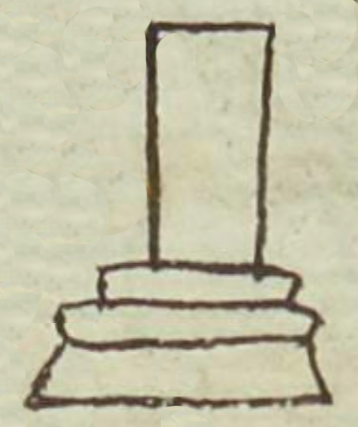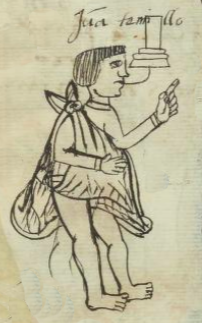Temilo (MH482v)
This black-line drawing of the simplex glyph for the personal name Temilo (here, attested as a man's name) shows the base of a round stone column (temimilolli), which may be a phonetic indicator for the name, given that it is a near homophone. It has a base of three layers. The column is cut off a short way up above the base. The column is made of stone (tetl), which could also be a phonetic indicator that the name starts with Te-.
Stephanie Wood
The term temimilolli involves a reduplication that is not obvious either in the name or in the drawing. The more conventional glyph for the name Temilo features the warrior hairstyle that involves a ponytail on the top of the head, tipping over. Sometimes a stone (tetl) is added as a phonetic complement to the start of the name Te-.
Juan José Batalla Rosado (2018, 85) shows how these round stone columns represent a kind of visual loanword, considering how they were introduced as a result of colonization and new architectural methods. The column was versatile. It appears in the Matrícula de Huexotzinco three times as an example of the name Tetlacuilol and another time as the name Tepiyaz (see below).
The name Temilo deserves further research. A folklore character named Temilo was associated with Mount Tlaloc and was said--in a twenty-first-century ethnographic retelling--to represent the "devil" and have a role in the construction of the cathedral in Puebla. [See: Jay Sokolovsky, Indigenous Mexico Engages the 21st Century, 2016, p. 151.]
A don Pedro Temilo (also called Temilotzin, in the reverential) was the first governor of Tlatelolco after the Spanish seized power. [See Justyna Olko, Insignia of Rank in the Nahua World, 1992, p. 210.] Miguel León-Portilla (Fifteen Poets of the Aztec World, 2000, ch. 9) relates that Temilotzin is especially known for trying to defend the Mexica capital against the Spanish invasion. He held the military rank of tlatecatl, and he fought alongside Cuauhtemoc.
Stephanie Wood
Juā temillo
Juan Temilo
Stephanie Wood
1560
Stephanie Wood
stones, piedras, carve, talar, arquitectura, nombres de hombres

temimil(li), round stone column, https://nahuatl.wired-humanities.org/content/temimilli-0
temilo(tl), a warrior hairstyle,
https://nahuatl.wired-humanities.org/content/temilotl
Base de una Columna de Piedra Redonda (?)
Stephanie Wood
Matrícula de Huexotzinco, folio 482v, World Digital Library. https://www.loc.gov/resource/gdcwdl.wdl_15282/?sp=44&st=image
This manuscript is hosted by the Library of Congress and the World Digital Library; used here with the Creative Commons, “Attribution-NonCommercial-ShareAlike 3.0 License” (CC-BY-NC-SAq 3.0).







